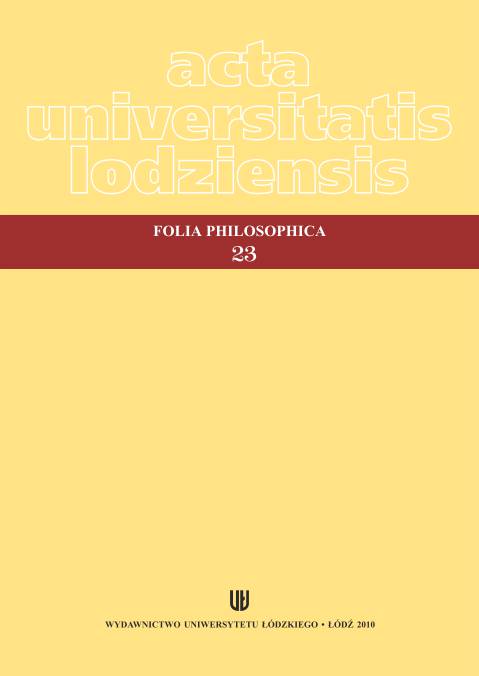Fiodor Dostoyevsky on Imperfection of Human Cognition
DOI:
https://doi.org/10.18778/0208-6107.23.07Abstract
Fiodor Dostoyevsky in his oeuvre indicates certain attitudes, which are often recognized in the process of man's thinking and behavior. They are conditioned by the manner he perceives reality and they in themselves appoint simultaneously this way of world perception. Some of those occurrences resemble in a great manner the defense mechanisms, which are described in the later literature. A first mechanism that was analyzed is pursue simplification, which causes a man to believe that thanks to the achieved knowledge he will be able to set in order and fix imperfect reality. Such attitude enforces simplified vision of the world, which in turn helps in self-deception. Dostoyevsky's heroes have problems to recognize true motives of their own behaviors or they intentionally attribute nobler incentives to themselves. Therefore the next described attitude is reluctance to acknowledge the truth. The Russian writer rejects generally accepted disjunctivity of the 'truth and false' category and he attributes the final might to acknowledge something as true or false to the man's will. On account of innate laziness and refractoriness, man chooses the simplest solutions, which in point of fact dismiss possibility to see real reasons for all failures. It makes impossible to undertake activities, which could indeed change something. Man is characterized by irresponsibility for his actions and words. A word looses its causative meaning and becomes purely a decoration, an ornament. All these make that learning the truth, as one of the elements propelling development of the philosophy, was not impossible but it was unwanted.
References
Berdyaev, N. 1957, Dostoevsky. New York: Meridian Books.
Google Scholar
Bierdiajew, N. 2001, Obraz człowieka w twórczości Dostojewskiego, (tł. S. Chabiera).
Google Scholar
W: J. Dobieszewski (red.), Wokół Leontjewa i Bierdiajewa. Warszawa: Wydawnictwo Uniwersytetu Warszawskiego, seria Almanach Myśli Rosyjskiej.
Google Scholar
Brzoza, H. 1995, Dostojewski. Między mitem, tragedią i apokalipsą. Toruń: Wydawnictwo Uniwersytetu Mikołaja Kopernika.
Google Scholar
Dostojewski, F. M. 1992a, Idiota, (tł. J. Jędrzejewicz). Londyn: Puls.
Google Scholar
Dostojewski, F. M. 1992b, Młodzik, (tł. M. Bogdaniowa i K. Błeszyński). Toruń: Wydawnictwo „Algo”.
Google Scholar
Dostojewski, F. M. 1992c, Notatki z podziemia, (tł. G. Karski). Londyn: Puls.
Google Scholar
Dostojewski, F. M. 1992d. Zbrodnia i kara, (tł. Cz. Jastrzębiec-Kozłowski), Londyn: Puls.
Google Scholar
Horney, K. 2001, Nerwica a rozwój człowieka, (tł. Z. Doroszowa). Poznań: Rebis.
Google Scholar
Miłosz, Cz. 1998, Rodzinna Europa. Warszawa: Czytelnik.
Google Scholar
Nietzsche, F. 1996, Antychrześcijanin. Przekleństwo chrześcijaństwa, (tł. G. Sowiński). Kraków: Zakład Wydawniczy „Nomos”.
Google Scholar
Ossowska, M. 2000, Normy moralne. Próba systematyzacji. Warszawa: PWN.
Google Scholar
Szacki, J. 2003, Historia myśli socjologicznej. Wydanie nowe. Warszawa: PWN.
Google Scholar
Szestow, L. 1995, Sola fide. Tylko przez wiarę. (tł. C. Wodziński). Warszawa: PWN.
Google Scholar
Wilson, C. 1992, Outsider, (tł. M. Traczewska). Poznań: Rebis.
Google Scholar
Downloads
Published
How to Cite
Issue
Section
License

This work is licensed under a Creative Commons Attribution-NonCommercial-NoDerivatives 3.0 Unported License.












